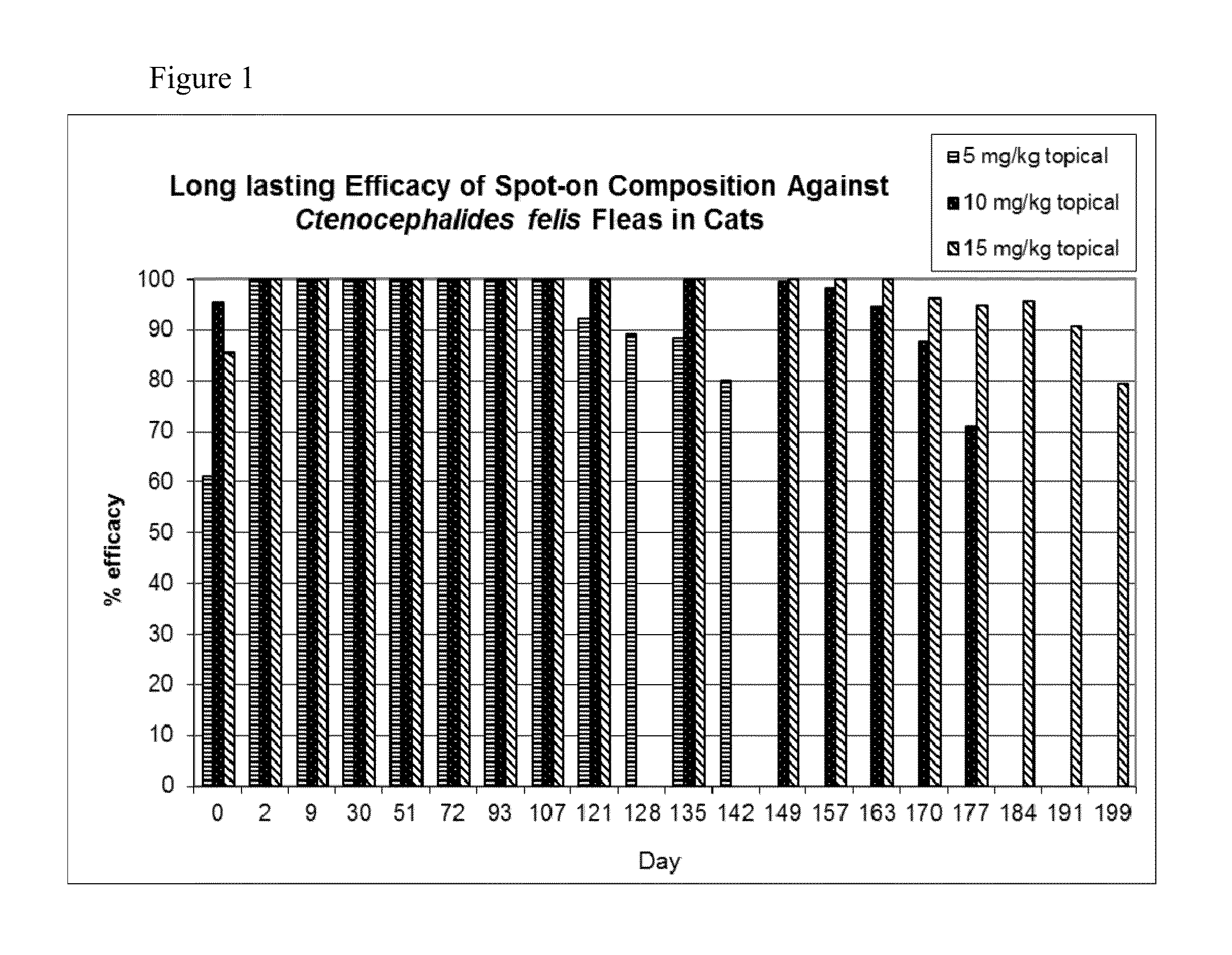Parasiticidal compositions comprising an isoxazoline active agent, methods and uses thereof
a technology of isoxazoline and composition, applied in the field of parasiticidal compositions, can solve the problems of affecting the health of animals, affecting the survival rate of animals, and affecting the ability of animals to adapt to parasite infestation/infection, and achieve the effects of long duration of activity, high activity efficiency, and high bioavailability
- Summary
- Abstract
- Description
- Claims
- Application Information
AI Technical Summary
Benefits of technology
Problems solved by technology
Method used
Image
Examples
examples
[0359]The invention is further described by the following non-limiting examples which further illustrate the invention, and are not intended, nor should they be interpreted to, limit the scope of the invention.
formulation examples
[0360]Liquid vehicles suitable for topical isoxazoline-containing formulations for control of parasites were investigated. As a non-limiting example, the isoxazoline compound 4-[5-[3-chloro-5-(trifluoromethyl)phenyl]-4,5-dihydro-5-(trifluoromethyl)-3-isoxazolyl]-N-[2-oxo-2-[(2,2,2-trifluoroethyl)amino]ethyl]-1-naphthalanecarboxamide (Cmpd. A), was investigated for topical delivery to animals, including cats, dogs and livestock animals such as cattle. Formulations comprising an isoxazoline compound in combination with one or more additional active agents, including (S)-methoprene, pyriproxyfen and nitenpyram, were also prepared and tested.
[0361]Formulations were prepared with a variety of liquid carrier vehicles and evaluated for effectiveness to control ectoparasites, particularly fleas and ticks in cats and dogs, and ticks, mites and lice in cattle. Solvent systems comprising either one solvent, including a diester of a dicarboxylic acid and / or an ether such as dimethyl isosorbide,...
example 1
Efficacy of a Spot-on Composition Comprising a Combination of Cmpd. A and (S)-Methoprene Against Dermacentor variabilis Ticks and Ctenocephalides felis Fleas in Dogs
[0398]Twenty eight beagle dogs were studied to determine the effectiveness of a combination of Cmpd. A and (S)-methoprene when administered once as a topical solution against induced infestations of Dermacentor variabilis and Ctenocephalides felis.
[0399]Four Treatment Groups containing seven dogs each were formed. Dogs in Group 1 were untreated (control). Dogs in Groups 2, 3 and 4 were treated topically with spot-on compositions comprising 3.7% (w / v) Cmpd. A and 9% (w / v) (S)-methoprene administered to deliver 2.5 mg / kg Cmpd. A and 6 mg / kg (S)-methoprene (Group 2: Transcutol with 10% (w / v) ethanol, 5% (w / v) TWEEN 80 and 5% (w / v) polyvinylpyrrolidone; Group 3: DMI and glycerol formal (GF); and Group 4: DIPA). All dogs were treated once on Day 0.
[0400]All dogs were infested with approximately 100 C. felis on Days −1, 8, 15...
PUM
| Property | Measurement | Unit |
|---|---|---|
| temperature | aaaaa | aaaaa |
| pH | aaaaa | aaaaa |
| solubility | aaaaa | aaaaa |
Abstract
Description
Claims
Application Information
 Login to View More
Login to View More - R&D Engineer
- R&D Manager
- IP Professional
- Industry Leading Data Capabilities
- Powerful AI technology
- Patent DNA Extraction
Browse by: Latest US Patents, China's latest patents, Technical Efficacy Thesaurus, Application Domain, Technology Topic, Popular Technical Reports.
© 2024 PatSnap. All rights reserved.Legal|Privacy policy|Modern Slavery Act Transparency Statement|Sitemap|About US| Contact US: help@patsnap.com










